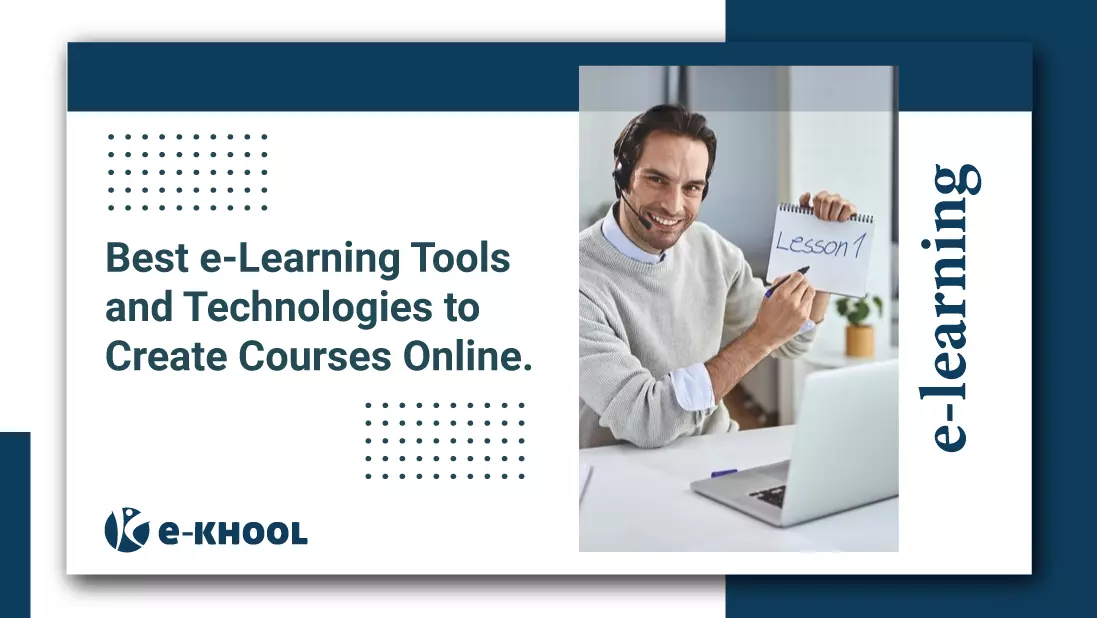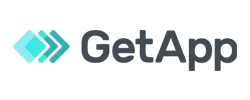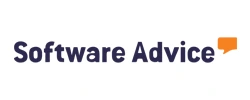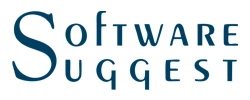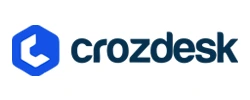There are many advantages to e-learning authoring tools for both learners and educators, and the sector is one that is expanding quickly. Accessible at any time and from any location, e-learning enables flexible, personalized, and interactive learning experiences. Using the appropriate tools and technology is essential if you're an educator, trainer, or content developer who wants to design compelling online courses. Adding videos and documents to a website is simply one aspect of online learning. In order to maximize the learning results and student happiness, you must design, produce, and deliver your courses in this manner through best LMS e-learning tools.
Let's have a look at the overview of this article
The Importance of Online Education using eLearning Tools
The necessity for online education as a practical and efficient substitute for conventional classroom instruction has been brought to light by the COVID-19 pandemic. Online education has many advantages, including adaptability, affordability, personalization, and cooperation. No matter where they are, what time zone they are in, or what they have previously studied, learners have access to a variety of courses and resources from various organizations and subject matter experts through eLearning software tools. Since learners are exposed to a variety of perspectives and problems through online learning, these abilities can also be fostered. Yet, there are other difficulties with online learning as well, including technological problems, a lack of motivation, loneliness, distraction, and quality control. Online learning using elearning tools must therefore be carefully planned, designed, implemented, and evaluated to guarantee that it satisfies the requirements and expectations of both learners and educators.
There are many other methods for learning online, including through online courses, webinars, podcasts, simulations, games, and more. Learners can gain several advantages from e-learning, including adaptability, practicality, interactivity, personalization, and feedback in eLearning software tools.
Challenges Encountered in Online Education
e-learning also faces many challenges and barriers that may affect the effectiveness and quality of elearning tools and technologies. Some of the factors that influence e-learning are:
Learner characteristics:
How a learner interacts with e-learning materials and activities might vary depending on their motivation, attitude, prior knowledge, learning style, self-regulation, and cognitive ability through elearning tools and technologies. Learners with higher degrees of digital skills and thinking skills, as well as those who are motivated, optimistic, and self-directed, typically perform better in e-learning environments than those without these qualities.
Instructor characteristics:
In e-learning, the instructor's responsibilities include designing, facilitating, and assessing the learning process. The learner's happiness, engagement, and success in e-learning can be influenced by the instructor's knowledge, educational skills, communication skills, feedback methods, and presence. A sense of community and trust among learners can be fostered by instructors who are educated, encouraging, attentive, and visible, and this can improve student learning results.
Content characteristics:
The information, knowledge, and skills that are imparted to learners through a variety of media and forms are referred to as the content of e-learning. The learner's interest, comprehension, retention, and ability to apply what they have learned can be influenced by the content's relevance, accuracy, currency, clarity, coherence, interactivity, and alignment with the learning objectives and outcomes. The learner's motivation and performance in eLearning authoring tools can be raised by providing meaningful, current, clear, consistent, engaging, and aligned content.
Technology characteristics:
The hardware, software, network, and platform that are used to offer and support e-learning are referred to as the eLearning authoring tools. The learner's access, participation, engagement, collaboration, and feedback in e-learning may be impacted by the availability, accessibility, reliability, usability, functionality, compatibility, and security of the technology. Technology that is readily available, approachable, dependable, user-friendly, functional, compatible, and secure helps lessen learners' worry and irritation while enhancing their e-learning experience from top eLearning authoring tools.
Top Resources for e-Learning Excellence
In the digital age, online learning has emerged as a popular and practical method of learning new skills and information. Even yet, not all online learning platforms are made equal, and some might provide superior features, information, and customer service. This article will evaluate some of the top eLearning authoring tools for online learning that can improve your online learning experience and help you meet your educational objectives.
Some of the criteria that we used to evaluate the best eLearning tools for online learning are:
Quality and variety of courses:
The platform should provide a variety of courses covering a variety of topics, skill levels, and delivery methods, including video lectures, interactive quizzes, assignments, tasks, etc. in best eLearning tools. Along with being well-designed, interesting, and current with industry trends and advancements, the courses should be.
Accessibility and flexibility:
The best elearning authoring software needs to be simple to use and access on any device, whether a laptop, tablet, or smartphone. You should have the ability to download or view the course materials offline with the tool, and you should be able to learn at your own pace and on your own schedule inside best elearning authoring software.
Affordability and value:
The platform should provide free trials or previews in addition to affordable fees and discounts for the courses. Additionally, the tool should offer certificates or credentials that institutions or employers may verify and accept.
Community and support:
The platform should offer the learners the necessary community and support, such as instructors, mentors, tutors, or peers. Also, the tool should encourage learners to work together and form communities through the use of forums, chat rooms, groups, and live sessions inside best elearning software.
Enhancing the Effectiveness of Online Learning Platforms via Learning Management Systems (LMS)
In the digital age, online learning has emerged as a popular and practical method oflearning new skills and information. Yet not every online learning environment is made equal. While some might provide a rich and interesting learning experience, others might be uninteresting and ineffective. How can the effectiveness of online learning systems be evaluated and enhanced from interactive course authoring tools.
Using a learning management system (LMS), an interactive course authoring tools to create, deliver, and assess online courses is one option. A learning management system (LMS) is software that enables instructors to develop and administer online learning materials as well as monitor and evaluate learners' performance. A LMS course creation software can also help students and teachers collaborate and communicate, as well as give feedback and support
LMS can enhance the efficiency of online learning platforms by providing elearning tool features such as:
Content creation and delivery:
With the aid of an LMS, instructors may produce and upload a variety of content for learners to access at any time and from any location, including videos, presentations, quizzes, assignments, and more on e-learning tool features.
Communication and collaboration:
In course creation software, the use of technologies like chat, forums, email, video conferencing, and other channels, LMS may promote synchronous and asynchronous interaction and cooperation between instructors, learners, and colleagues.
Feedback and evaluation:
The use of data and analytics in a learning management system (LMS) enables instructors to give learners fast and tailored feedback as well as track and assess their progress, engagement, and satisfaction through interactive course authoring tools.
Personalization and adaptation:
In addition to receiving customized content and support based on their existing knowledge, abilities, and requirements, LMS can enable learners to customize their learning paths, preferences, and goals as best eLearning software.
Integration and interoperability:
LMS can integrate with other systems and platforms, such as social media, cloud services, e-commerce, etc., to offer a seamless and holistic learning experience.
Also read: LMS Benefits in Online Education and Professional Workspaces
Exploring the Best Learning Management System (LMS) and its Advantages
e-khool, a cloud-based, one of the best elearning authoring software, that provides a full range of features and functions for learners, instructors, and administrators, is one of the top LMSs available today. e-khool as a best elearning authoring software is a dependable and efficient solution for varied learning needs and scenarios since it is meant to be user-friendly, customizable, expandable, and secure.
Content creation tools:
As best elearning authoring software, that help you create engaging and interactive content for your online courses, such as videos, animations, presentations, quizzes, games, simulations, etc.
Content delivery tools:
best eLearning tools that help you deliver your content to your learners in a seamless and accessible way, such as cloud storage, streaming services, web conferencing, etc.
Content integration tools:
These are tools that help you integrate your content with your LMS and other platforms, such as APIs, plugins, extensions, etc.
Some of the benefits of using e-khool as your LMS are:
- It supports a variety of content kinds, including surveys, quizzes, animations, audio, and video. You may quickly develop and submit your own content or use the pre-made resources and courses in the built-in library through best eLearning tools.
- With features like live chat, forums, blogs, wikis, polls, groups, and social media integration, it facilitates interactive and collaborative learning. In order to engage and motivate your learners, you can also add gamification components like badges, points, leaderboards, and certifications.
- It offers robust analytics and reporting capabilities that let you monitor and assess the development and effectiveness using interactive course authoring tools of your learners, courses, and programs. Additionally, you may create personalized dashboards and reports to display and distribute your data to stakeholders.
- It enables you to brand and personalize your learning environment in accordance with your tastes and needs. With its API and webhooks, e-khool can also be integrated with other programs and platforms. It delivers a mobile-friendly, responsive design that fits any device's or screen size. With the help of its mobile app for iOS and Android devices, you may also access e-khool offline.
- With features like encryption, authentication, authorization, backup, recovery, and adherence to industry standards and regulations, it guarantees the security and privacy of your data and users.
One of the best LMSs with interactive course authoring tools. to assist you accomplish your learning goals and objectives is e-khool. e-khool can offer you a versatile and reliable platform that meets your demands, whether you want to offer online courses for education or training purposes or to improve your personal or professional development. Go to their website or get in touch with their support staff right now to find out more about e-khool and its advantages.
Frequently asked questions
Some frequently asked questions on e-learning and technologies for online course creation are:
1. What is e-learning and why is it important?
e-learning is the use of digital technologies to deliver, support, and enhance learning and teaching. e-learning can offer many benefits, such as increased access, flexibility, engagement, collaboration, and personalization of learning experiences.
2. What are some common technologies for online course creation?
Some common technologies for online course creation include learning management systems (LMS), authoring tools, video and audio tools, web conferencing tools, social media tools, and mobile devices.
3. How do I choose the best technology for my online course?
The best technology for your online course depends on your learning objectives, target audience, content type, pedagogical approach, budget, and technical skills. You should consider the advantages and disadvantages of each technology, as well as the compatibility, accessibility, usability, and security issues.
4. How do I design an effective online course?
An effective online course should follow the principles of instructional design, such as alignment, interactivity, feedback, assessment, and evaluation. You should also consider the best practices of online course design, such as chunking, sequencing, scaffolding, multimedia, and accessibility.
5. How do I facilitate an engaging online course?
An engaging online course should foster a sense of community, collaboration, and communication among learners and instructors. You should also use various strategies to motivate, support, and challenge learners, such as gamification, personalization, differentiation, and scaffolding.
Conclusion
e-learning is a rapidly growing field that offers many benefits for learners and educators. e-learning can provide flexible, personalized, and interactive learning experiences that can enhance the quality and effectiveness of education. However, e-learning also poses some challenges, such as the need for adequate technological infrastructure, pedagogical design, and learner support. To address these challenges, educators need to use appropriate tools and platforms for creating and delivering online courses. One such platform is e-khool LMS, which is a cloud-based learning management system that enables educators to create, manage, and deliver online courses with ease and efficiency. e-khool LMS integrated with best eLearning tools offers various features and functionalities that can facilitate e-learning, such as course creation, content management, assessment, communication, collaboration, analytics, and gamification. e-khool LMS with advanced interactive course authoring tools also supports various types of e-learning content, such as text, images, videos, audio, animations, simulations, quizzes, and games. e-khool LMS can help educators to design engaging and effective online courses that can cater to the diverse needs and preferences of learners. In conclusion, e-learning is a valuable mode of education that can be enhanced by using e-khool LMS as a platform for online course creation.

